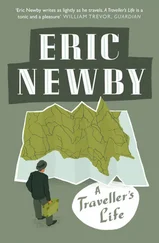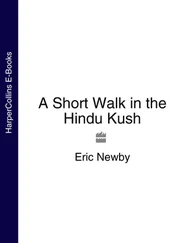While the boatmen were banking up a great fire we set off to see the sadhu. ‘He is very holy man,’ G. said as we lurched through the deep sand. ‘We must profit by meeting him. Now he is telling us many things.’ He was entranced at the prospect but I was oppressed by the thought of meeting yet another sadhu, most probably under a vow of perpetual silence, who would do nothing but stare at us until we went away.
Fortunately, the sadhu was not a sadhu at all, but an emaciated old man planted in the sand by God knows what authority to scare off poachers from the jungle on the opposite bank. It was difficult to see how he could do this as he was on the wrong side of the river and there was no means of crossing. He lived here, alone in his grass hut, all through the dry season from October to March. Now he was squatting outside it over a fire that was so minute that it barely gave off any heat at all, with a dish of water-chestnuts before him that looked as old and shrivelled as he was.
‘Yours is the only boat I have seen,’ he said when he had recovered from the rather extravagant greeting that G. had given him while still under the impression that he was a holy man, at the same time politely offering us the water-chestnuts of which there were only three. ‘Here I am very solitary but I have four sons and a wife in my village. It is a long way off and there is little to eat there, only gram.’ 11
‘She must be a difficult wife; otherwise no man would live alone in such a wilderness,’ Jagannath said, unkindly, when this conversation was reported to him. It was more probable that the old man remained there because he was very poor and fit for nothing else. We gave him some rice and chillies but he scarcely looked at them.
‘It is sufficient that you have come to visit me,’ he said. ‘Once there were many wild animals, but now there are many poachers. Few of the true hunting people, the real shikar log, come here any more.’
‘Well, if there are poachers why don’t you report them to the authorities?’
‘Huzoor,’ he said, simply, ‘how can you report a poacher to himself?’
It was a comfortable camp. We lay in the sand with all our goods and chattels heaped about us, like the defenders of Rorke’s Drift in a reproduction that hung in one of the corridors at school. There was a big fire. Dinner was rice and the awful tinned sausages that we were now forced to broach, thanks to the improvidence of the boatmen. It was fearfully cold. By eight o’clock we were all tucked up in bed, like naughty children. Genuinely afraid that the boatmen might die of exposure, we gave them two more blankets.
A fish leapt in the river and sank once again with a dull plop.
Bhosla was supposed to be the expert on fishes, but as he was not a forthcoming sort of man the process of finding out what sort of fish it was was a tedious one.
‘Mauli hai?’
‘Nahin!’
‘Kotha hai?’
‘Nahin!’
‘Rahu hai? Tengena hai? Lachi hai? Saunl hai? Gaunch hai?’
‘Nahin! Nahin! Nahin! Nahin! Nahin!’
‘Blast! Bam hai?’
‘Hai!’
‘Elephants come here in the rains,’ Karam Chand said helpfully, sensing my exasperation.
Sometime in the dark watches after midnight he woke me. He was in a state of alarm.
‘SAHIB! Tarch hai ?’
After some fumbling I found it in the bottom of my bedding roll.
‘ Ek nilgai bahut nazdik hai ,’ he said. In the beam of the torch two brilliant eyes regarded us unwinkingly.
Three parts asleep, unwilling to do so, but because Karam Chand wanted it we blundered about in the sand looking for the nilgai, the blue cow, a most inoffensive but destructive animal held sacred by the Hindus for its imagined relationship with the domestic cow – which, not unnaturally, had vanished. As a result I could not sleep any more.
At four it was fearfully cold. In spite of wearing skiing under-wear, a woollen shirt made from a piece of sixty-year-old Welsh flannel that had been one of my father’s bequests to me, a fisherman’s jersey, thick whipcord trousers, and being rolled in two thick blankets inside a bedding roll, I was frozen. I had read somewhere that the more clothes one wears the colder one feels, but this was no time to start stripping. Karam Chand, Bhosla and Jagannath had the felt blankets we had given them at Hardwar, the two extra blankets we had issued to them before we went to bed, a thin piece of carpet and a miserable quilt – and they wore cotton clothes; nevertheless they all three slept soundly.
At five the fruit bats began to go over. The men continued to sleep like logs.
‘They must be used to cold,’ I said to Wanda, who lay in bed with her teeth chattering.
‘They must be,’ she said picturesquely, ‘otherwise they’d bloody well be dead.’
It seemed as if the dawn would never come. The moon, a pale hemisphere, was churning its way through a sea of cirrus that was moving away, high over Garhwal. There was no wind and the river between the shoals was like sheets of black glass. At about six the sky to the east became faintly red; then it began to flame and the moon was extinguished; clouds of unidentifiable birds flew high overhead; a jackal skulked along the far shore and, knowing itself watched, went up the bank and into the trees; mist rose from the wet grass on the islands on which the shisham trees stood, wrapped like precious objects in their bandages of dead grass. Frozen stiff and full of sand we waited for the kettle to boil. It was only the second day of our voyage but the stubble on G.’s chin was beginning to sprout prodigiously.
The old man appeared, picking his way towards us through the sand on his painfully thin legs like a ragged heron. On one of his shins there was a deep, festering sore which Wanda had insisted needed attention. He had filled it with sump oil from a motor bus and underneath it was all rotten. ‘The nearest village is Bhagmalpur,’ he said as she probed about in the huge cavity, watched enviously by the boatmen who wished that they, too, could attract some sympathy and be the centre of attention. ‘It is a place of little consequence, but it is my village,’ he added, deprecatingly. The only place on the map of the area in which we found ourselves that had a name at all was Bhogpur.
‘Bhogpur is two kos from Bhagmalpur,’ he said.
If Bhogpur was two kos from Bhagmalpur then it might be possible to make a reasonable guess at our position. It depended on what he meant by a kos.
‘There are seventy rassis in one kos,’ Karam Chand said.
‘There are twelve hundred laggis in one kos,’ said Bhosla in a sudden garrulous outburst.
‘There are three thousand six hundred gaj in one kos,’ said Jagannath, the youngest boatman.
‘Now I am telling you,’ said G. ‘If one kos is three thousand six hundred gaj, there are two miles and eighty yards in one kos.’ If this was so, then we had not travelled more than five miles since the previous morning. 12
We left the old man standing on the bank with a parting gift of boracic lint, penicillin powder and biscuits, and carried the gear two hundred yards downstream to a place where the shoal ended; here we loaded the boat. It was now a quarter to eight. What the boatmen called Zirrea, small ringed plovers, compact little birds with neat scarves of black feathers round their necks and yellow legs, rose from the shingle in which they had been pecking, almost invisible, and wheeled over us, uttering despairing cries while a pair of orange-coloured Brahminy duck watched us warily from the shallows on the far side of the river.
In slow succession we dug our way through the sixteenth shoal and descended the sixteenth rapid and so on through the eighteenth and nineteenth, up to twenty-one. It would be tedious to enumerate them all but as we proceeded downstream, literally step by step, I made a note of them. It seemed unlikely that I would pass this way again and I knew that if I kept no record, for the rest of my life I would suspect that my memories of the Ganges below Hardwar were the figments of a disordered imagination.
Читать дальше












